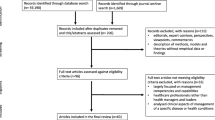Abstract
This study mapped the development of performance appraisal in UK universities and assessed the initial impact of appraisal in four case study institutions. University staff felt that appraisal has had little impact on their motivation, efficiency and performance. One reason for this may be the ambiguity surrounding the intentions of staff appraisal in universities: it is neither a management tool, nor is it wholly focused on staff development. If appraisal is primarily concerned with assessment, it must be linked to promotion and merit pay awards. The current arrangement of using agreed summaries from the appraisal interviews in promotion procedures is not entirely satisfactory and requires further consideration. If, on the other hand, appraisal is intended for the purposes of staff development, this aim should be explicity stated and backed up with adequate resources and effective procedures designed to ensure that identified training needs are met.
While universities have responded to the need to develop appraisal schemes there is very little sense in which appraisal has been given a coherent function in relation to other aspects of management. If appraisal is to promote change in universities, it must be incorporated in university and departmental planning.
Similar content being viewed by others
References
Buss, A.R. (1975). Systems Theory: Generation Theory and the university: some predictions’,Higher Education 4, 429–445.
Clarke, A.M., and Birt, L.M. (1982). ‘Evaluative reviews in universities: the influence of public policies’,Higher Education 11, 1–26.
Haslam, C., Bryman, A., and Webb, A. (1992). ‘The introduction of university staff appraisal’,Public Money and Management 12, 57–62.
Jarratt — Committee of Vice Chancellors and Principlas (1985).Report of the Steering Committee for Efficiency Studies in Universities (The Jarratt Report). CVCP.
Meyer, H.H., Kay E., and French, J.R.P. (1965). ‘Split roles in performance appraisal’,Harvard Business Review 43, 123–129.
Nathan, B.R., Mohrman, A.M. Jr., and Milliman, J. (1991). ‘Interpersonal relations as a context for the effects of appraisal interviews on performance and satisfaction: a longitudinal study’,Academy of Management Journal 2, 352–369.
Shattock, M.L. (1982). ‘How should universities plan for the future?’,Higher Education 11, 193–210.
Sizer, J. (1987). ‘The impacts of financial reductions on British Universities: 1981–84’,Higher Education 16, 557–580.
Townley, B. (1989). ‘Selection and appraisal: reconstituting “social relations”?’, in Storey, J. (ed.),New Perspectives in Human Resource Management. Routledge.
Author information
Authors and Affiliations
Rights and permissions
About this article
Cite this article
Haslam, C., Bryman, A. & Webb, A.L. The function of performance appraisal in UK universities. High Educ 25, 473–486 (1993). https://doi.org/10.1007/BF01383848
Issue Date:
DOI: https://doi.org/10.1007/BF01383848




